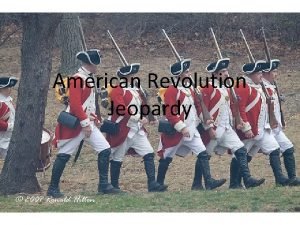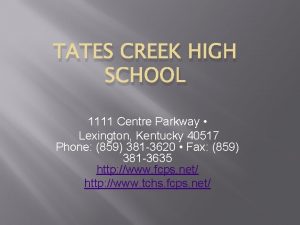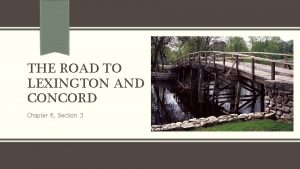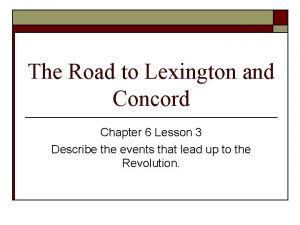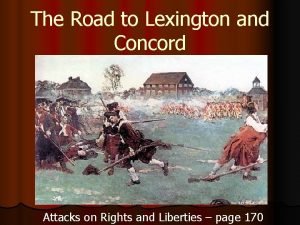THE ROAD TO LEXINGTON AND CONCORD CHAPTER 6







- Slides: 7

THE ROAD TO LEXINGTON AND CONCORD CHAPTER 6, SECTION 3 פרק חמישה סעיף שלוש Bell Ringer 1. Look at the map on page 172. What were the British forced to do after Concord? 2. What might the British action indicate about the colonists’ chances in a war against Britain?

The Intolerable Acts את חוקי הכפייה ● What were the Intolerable Acts? The Intolerable Acts were a series of laws to punish the Massachusetts colony and serve as a warning to other colonies. ● What effect did the Intolerable Acts have on the colonies? British officials were accused of crimes, and committees of correspondences were banned. ● How did the colonies come to the aid of Massachusetts? The colonies sent food and money to Massachusetts.

The First Continental Congress Meets/Between War and Peace בין מלחמה ושלום / הקונגרס הקונטיננטל הראשון ● What happened at the First Continental Congress? Delegates voted to ban all trade with Britain, until the Intolerable Acts were repealed ● How did the colonists protest the Intolerable Acts? How successful were they? They believed that trade boycott would force a repeal of the Acts. The colonists called on each colony to begin training troops. However, the were not successful in persuading Britain. ● What did most colonial leaders think about the prospect of war with Britain? They thought that any fight with Britain would be short. They also thought that a show of force would make Britain change its policies

The Midnight Ride הנסיעה בחצות ● What was the role of spies in the pre-revolutionary period? Their role was to watch over British activities. ● Why did Britain’s General Gage send troops to Lexington and Concord? He sent troops so they could arrest Adams and Hancock in Lexington and destroy the supplies in Concord ● What was the mission of the midnight riders? To spread the news about the British troop movements.

Lexington and Concord לקסינגטון וקונקורד What happened at the battles of Lexington and Concord? ● o 700 British troops arrived in Lexington ● o Captain John Parker and 70 militiamen were waiting for them ● o British tells them to surrender ● o In a few minutes 8 million militiamen dead ● o British went to Concord and destroyed supplies ● o British retreats cause a small battle to break out in a bridge north of town ● o 4, 000 minutemen and militiamen in a bridge north of town

Lexington and Concord לקסינגטון וקונקורד ● Why did Ralph Waldo Emerson call it the “shot heard ‘round the world? ” Ralph Waldo Emerson called it the “shot heard ‘round the world because Americans had to choose sides and back up their political opinions by force of arms. ● Who were the Loyalists and Patriots? The Loyalists were the people who supported The British and the Patriots were the people who supported the rebels.

KEY TERMS מילים אוצר o Militia: A force of armed civilians pledged to defend their community. o Minuteman: They were about one-third of the Militia, trained to be “ready to act at a minute’s warning. ” o Intolerable Acts: Harsh series of laws to punish the Massachusetts colony and serve as a warning to other colonies. o First Continental Congress: When all colonies except Georgia in September 1774 met in Philadelphia. Here delegates voted to ban all trade with Britain until the Intolerable Acts were repealed. o Paul Revere: was a Boston silversmith, and a 2 nd messenger for William Dawes o Lexington and Concord: were the first battles of the Revolutionary War o Loyalist: A person who remains loyal to the established government o Patriots: A person who vigorously supports their country





